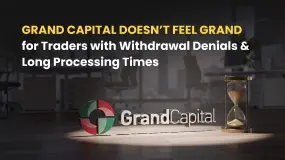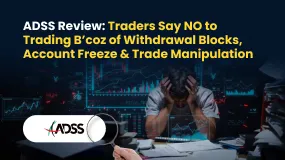简体中文
繁體中文
English
Pусский
日本語
ภาษาไทย
Tiếng Việt
Bahasa Indonesia
Español
हिन्दी
Filippiiniläinen
Français
Deutsch
Português
Türkçe
한국어
العربية
Are We in a Retracement Or the Start of a Financial Collapse?
Abstract:As markets fluctuation in uncertain times and headlines grow darker, investors are left asking a crucial question: Is this a temporary downturn or something far worse? The terms bear market, recession, and depression are often thrown around interchangeably, but they represent very different levels of economic pain. Read this article to understand the differences between all three.

As markets fluctuation in uncertain times and headlines grow darker, investors are left asking a crucial question: Is this a temporary downturn or something far worse? The terms bear market, recession, and depression are often thrown around interchangeably, but they represent very different levels of economic pain. Read this article to understand the differences between all three.

A bear market is defined by a decline of 20% or more from recent highs in major stock indices. Its usually sparked by shaken confidence: concerns over interest rates, corporate earnings, or geopolitical risks. While unsettling, bear markets are often short-lived compared to broader economic downturns.
Retail traders should view bear markets as a stress test for strategy. This is not the time for panic-selling. Instead, reassess your risk tolerance, rebalance portfolios, and consider accumulating strong assets that may be temporarily undervalued.

A recession cuts deeper. It involves a sustained slowdown in economic activity, typically marked by two consecutive quarters of negative GDP growth. During recessions, we see rising unemployment, consumer retrenchment, and slumping business confidence. The damage extends beyond markets – it affects everyday life.
In this phase, central banks often respond with stimulus, but recovery can be uneven. Traders may benefit by shifting towards defensive sectors like healthcare, consumer staples, or utilities, and staying alert to monetary policy changes that affect interest rate-sensitive assets.

A depression is not just a deeper recession – it's a prolonged economic collapse. The most infamous example, the Great Depression of the 1930s, lasted nearly a decade and redefined global finance. Severe contractions in output, extreme unemployment, and widespread bankruptcies define this grim reality.
While modern safeguards have made depressions less likely, they are not impossible. For investors, the focus must shift from profit to preservation: high cash reserves, minimal leverage, and ultra-conservative asset choices. It's about surviving first, thriving later.

Historical Comparison of Bear Markets, Recessions, and Depressions
The real truth is, no can guarantee what happens next in the market. By the time it‘s clear whether we’re in a bear market, a recession, or worse, it may be too late to act. Thats why preparation is more essential than prediction.
To stay resilient in times of uncertainty, retail investors should adopt a disciplined and strategic approach. Diversification is key because not all assets react the same way to market shocks, spreading exposure across different sectors and global markets can help cushion losses. Maintaining liquidity is equally important; having enough cash on hand allows investors to take advantage of sudden opportunities or weather financial setbacks. Employing stop-loss strategies with care can also protect capital when emotions run high and markets turn volatile. Rather than reacting to headlines, investors should pay close attention to hard data such as unemployment figures, inflation rates, and central bank policy updates which often provide clearer signals of economic direction. Above all, maintaining a long-term perspective is crucial: while short-term downturns can be painful, they often present the foundation for future growth when navigated wisely.

Disclaimer:
The views in this article only represent the author's personal views, and do not constitute investment advice on this platform. This platform does not guarantee the accuracy, completeness and timeliness of the information in the article, and will not be liable for any loss caused by the use of or reliance on the information in the article.
Read more

Grand Capital Doesn’t Feel GRAND for Traders with Withdrawal Denials & Long Processing Times
The trading environment does not seem that rosy for traders at Grand Capital, a Seychelles-based forex broker. Traders’ requests for withdrawals are alleged to be in the review process for months, making them frustrated and helpless. Despite meeting the guidelines, traders find it hard to withdraw funds, as suggested by their complaints online. What’s also troubling traders are long processing times concerning Grand Capital withdrawals. In this Grand Capital review segment, we have shared some complaints for you to look at. Read on!

ADSS Review: Traders Say NO to Trading B’coz of Withdrawal Blocks, Account Freeze & Trade Issues
Does ADSS give you plenty of excuses to deny you access to withdrawals? Is your withdrawal request pending for months or years? Do you witness account freezes from the United Arab Emirates-based forex broker? Do you struggle to open and close your forex positions on the ADSS app? Does the customer support service fail to respond to your trading queries? All these issues have become a rage online. In this ADSS Broker review article, we have highlighted actual trader wordings on these issues. Keep reading!

INGOT Brokers Regulation 2025: ASIC vs Offshore License - What Traders Must Know
Explore INGOT Brokers regulation in 2025: Compare their ASIC and Seychelles FSA licenses, understand trader protection levels, and learn about potential risks in this detailed guide.

INGOT Brokers Review 2025: High Risk or Hidden Gem? Expert Analysis Reveals All
Comprehensive INGOT Brokers review exploring the broker's mixed reputation in 2025. Discover the truth about regulation, trading options, and user experiences before opening an account.
WikiFX Broker
Latest News
Consob Targets Political Deepfake “Clone Sites” and Unlicensed Platforms in Latest Enforcement Round
WikiEXPO Global Expert Interviews: Gustavo Antonio Montero: ESG in Finance
2 Malaysians Arrested in $1 Million Gold Scam Impersonating Singapore Officials
Is FXPesa Regulated? Real User Reviews & Regulation Check
Fraud Mastermind Zhimin Qian Sentenced to 11 Years for $6.6 Billion Bitcoin Ponzi Scheme
Almahfaza Broker – 2025 Review: Safe or Scam?
Uniglobe Markets Review 2025: A Complete Guide to an Unregulated Broker
INZO Broker No Deposit Bonus: A 2025 Deep Dive into Its Offers and Risks
Exness Broker Expands in South Africa with Cape Town Hub
Global Guide to Finding Forex IBs/Brokers — Share Your Pick and Win Big!
Currency Calculator



